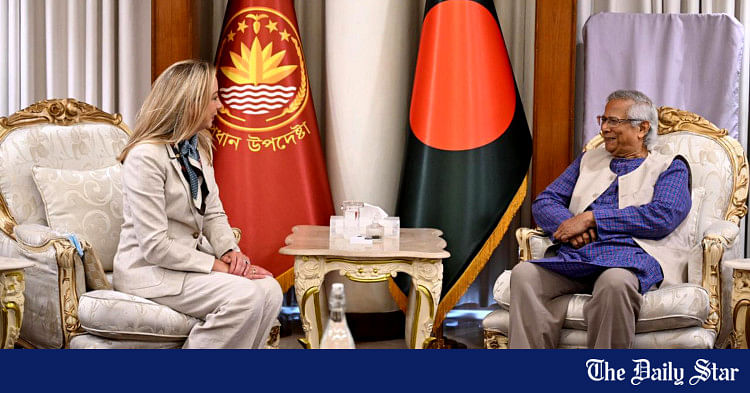Summary
Emphasising inclusive healthcare, Chief Adviser Prof Muhammad Yunus yesterday said they are prioritising digital healthcare so that people in Bangladeshs remote areas can consult doctors online.
Source: The Daily Star

AI News Q&A (Free Content)
Q1: What are the key strategies behind Bangladesh's initiative towards digital healthcare as part of the 'Smart Bangladesh' vision?
A1: The 'Smart Bangladesh' initiative aims to transform the country into a technologically advanced society, with smart healthcare being a critical component. The strategy includes developing community and mobile clinics to extend healthcare access, particularly in rural areas. These efforts are part of a broader plan to create smart cities and institutions, focusing on sustainable development and equitable healthcare access across Bangladesh.
Q2: How does the integration of blockchain technology improve security and safety in AI-based healthcare systems?
A2: Blockchain technology offers a secure and decentralized framework for managing digital transactions and patient data. In AI-based healthcare systems, blockchain ensures data integrity and transparency, making digital assets unalterable via cryptographic methods. This enhances security by protecting sensitive medical information from unauthorized access, thereby increasing trust and safety in digital healthcare applications.
Q3: What are the challenges faced by current digital healthcare solutions, particularly concerning the Internet of Medical Things (IoMT)?
A3: Current digital healthcare solutions face significant challenges, such as latency and reliability issues due to traditional IoT-Cloud models. The Internet of Medical Things (IoMT) devices often lack the resources necessary for robust security, posing risks to sensitive data. Research suggests adopting decentralized adaptive security architectures to address these issues, ensuring that IoMT devices can operate securely and efficiently.
Q4: What impact does remote patient management have on heart failure patients in rural areas compared to urban areas?
A4: Remote patient management (RPM) in heart failure patients shows varied effectiveness based on geographical factors. Studies indicate that patients in rural areas benefit significantly from RPM due to the limited accessibility of specialized heart failure care. RPM reduces travel distances and improves clinical outcomes by providing consistent monitoring and intervention, which is often challenging in rural settings.
Q5: How does digital accessibility in healthcare enhance patient engagement, particularly for those with disabilities?
A5: Digital accessibility in healthcare, including platforms like telemedicine and online pharmacies, is crucial for patient engagement, especially for individuals with disabilities. Comprehensive solutions that address auditory, visual, cognitive, and motor impairments enable these patients to manage their health effectively. Enhanced accessibility features ensure that all users, regardless of their abilities, can benefit from digital healthcare services.
Q6: What role does digital healthcare play in addressing the healthcare needs of Bangladesh's remote areas?
A6: Digital healthcare plays a transformative role in addressing the healthcare needs of Bangladesh's remote areas by facilitating online consultations with doctors. This approach mitigates the challenges posed by physical distances and limited healthcare infrastructure, ensuring that individuals in rural regions have timely access to medical advice and services.
Q7: What are the potential benefits of using 6G technology in future digital healthcare systems?
A7: 6G technology promises to fulfill the requirements of future digital healthcare systems through advanced decentralized computing and secure communication frameworks. It addresses current challenges by providing high-speed, reliable connectivity and adaptive security measures, thereby supporting the deployment of efficient digital healthcare solutions that meet the complex needs of modern medical environments.
References:
- Smart Bangladesh: https://en.wikipedia.org/wiki/Smart_Bangladesh
- Adaptive Security in 6G for Sustainable Healthcare: https://arxiv.org/abs/2024.03.02
- healthAIChain: Improving security and safety using Blockchain Technology applications in AI-based healthcare systems: https://arxiv.org/abs/2023.11.01
- Advancing Digital Accessibility In Digital Pharmacy, Healthcare, And Wearable Devices: https://arxiv.org/abs/2025.05.29
- Rurality, travel distance, and effectiveness of remote patient management in patients with heart failure in the TIM-HF2 trial in Germany: https://pubmed.ncbi.nlm.nih.gov/2025-05-18/



